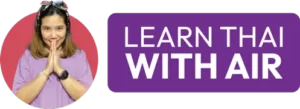Welcome to basic Thai expressions which are frequently used in our daily life, your first step to conversational Thai. In this first part of our blog series with audio clips, we’ll explore essential Thai phrases that you can use in daily conversations. Whether you’re traveling to Thailand, building friendships with Thai speakers, or just beginning your language-learning journey, these phrases will help you communicate effectively and naturally.
Tips for learning from this blog post:
✦Listen and Repeat: Focus on pronunciation by listening to audio clips and repeating the phrases out loud. Pay attention to tones, as Thai is a tonal language, and meaning can change depending on the pitch.
✦Practice Often: Use these expressions in daily conversations. Whether it’s with a friend or a language exchange partner, applying what you’ve learned in real-life situations will reinforce your skills.
✦Stay Polite: Remember to use polite particles at the end of sentences to maintain politeness when speaking Thai. It will go a long way in showing respect for the culture and making positive connections with Thai speakers.
1. Polite particles added at the end of the sentences.
1.1 ‘kâ’ ค่ะ (falling tone) and ‘ká’ คะ (high tone) are ending particles for female speakers to affirm a statement and to ask a question accordingly.
1.2. ‘kráp’ ครับ (high tone) is an ending particle for male speakers to affirm a statement or to ask a question.
2. ‘I’ as a pronoun.
2.1 ‘Chǎn’ ฉัน (rising tone) is a written form for female speakers. In spoken Thai language, ‘chán’ ชั้น (high tone) is commonly used.
2.2 ‘Pǒm’ ผม (rising tone) is used by male speakers.
2.3 There are many more Thai words for ‘I’ which are used casually or in a less-polite way.
Let’s start your Thai journey here!
1. Hello สวัสดีค่ะ/ครับ
Sàwàtdee kâ/kráp
2. What is your name คุณชื่ออะไรคะ/ครับ?
Kun chêuu arai ká/kráp?
3. My name is/ I am ผม/ฉัน/เราชื่อ…
Pǒm/Chán/Rao chêuu…
4. It’s nice to meet you ยินดีที่ได้รู้จัก
Yindee têe dâai róo jàk
5. Where are you from? มาจากไหน? / มาจากประเทศอะไร?
Maa jàak nǎi? / Maa jàak pbrà-têt arai?
6. Thank you ขอบคุณค่ะ/ครับ
Kòp kun kâ/kráp
7. Thank you very much ขอบคุณมากๆ
Kòp kun mâak mâak
🌸มาก /mâak/ = much; many; a lot; very
8. Sorry ขอโทษค่ะ/ครับ
Kǒr tôd kâ/kráp
🌸ขอ /kǒr/ = to ask
9. Excuse me ขอทางหน่อยค่ะ/ครับ
Kǒr taang nòi kâ/kráp
🌸ทาง /taang/ = way; path
10. You’re welcome ยินดี / ด้วยความยินดี
Yindee / Dûay kwaam yindee
🌸ด้วย /dûay/ = with
🌸ยินดี /yindee/ = glad; happy (adj)
🌸ความยินดี /kwaam yindee/ = gladness; happiness
11. No worries ไม่เป็นไร
Mâi bpen rai
(No worries; You’re welcome)
🌸ไม่ /mâi/ = no, not
🌸เป็น /bpen/ = verb to be
🌸ไร /rai/ (อะไร /arai/) = what
12. No problem ไม่มีปัญหา
Mâi mee pban-hǎa
🌸ไม่มี /mâi mee/ = There is no; no…; not…
🌸ปัญหา /pban-hǎa/ = problem; trouble
13. Can you speak Thai? คุณพูดภาษาไทยได้มั้ย?
Kun pôot paa-sǎa Thai dâai mái?
🌸คุณ /kun/ = you
🌸พูด /pôot/ = speak
🌸ภาษา /paa-sǎa/ = language
🌸ได้มั้ย /dâai mái/ = can?
14. Can you speak English? คุณพูดภาษาอังกฤษได้มั้ย?
Kun pôot paa-sǎa ang-grìt dâai mái?
🌸อังกฤษ /ang-grìt/ = English
15. I can speak…a little พูดได้นิดหน่อย
Pôot dâai nít-nòi
🌸ได้ /dâai/ = can
🌸นิดหน่อย /nít-nòi/ = a little; a bit
16. I can’t speak… พูดไม่ได้
Pôot mâi dâai
🌸ไม่ /mâi/ = no; not
🌸ไม่ได้ /mâi dâai/ = cannot
17. I’m American ฉัน(ผม)เป็นคนอเมริกา
Chán (Pǒm) bpen kon America
🌸เป็น /bpen/ = to be
🌸คน /kon/ = people
18. Are you Thai? คุณเป็นคนไทยใช่มั้ย?
Kun bpen kon Thai châi mái?
🌸ใช่มั้ย /châi mái/ = are you?
19. Can you teach me Thai language? สอนภาษาไทยให้ผมได้มั้ย?
Sǒn paa-sǎa Thai hâi chán (pǒm) dâi mái?
🌸สอน /sǒn/ = to teach
20. I want to learn Thai language. ฉัน(ผม)อยากเรียนภาษาไทย
Chán (Pǒm) yàak riaan paa-sǎa Thai
🌸เรียน /rean/ = learn; study (I want to learn Thai language)
